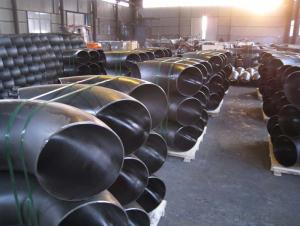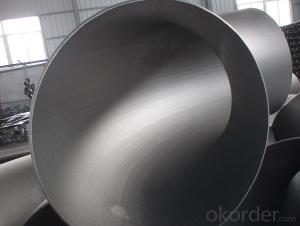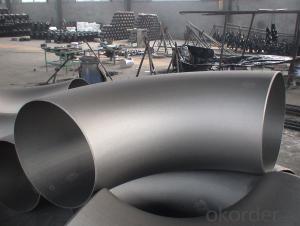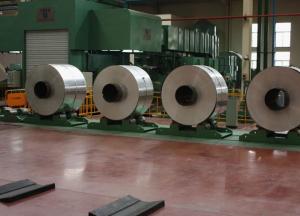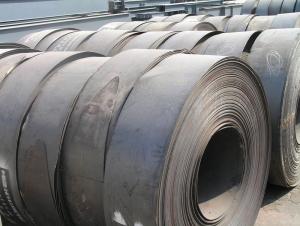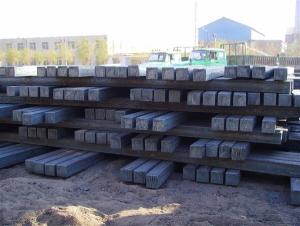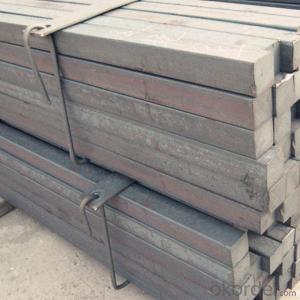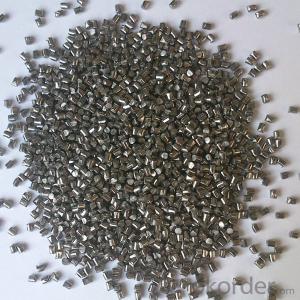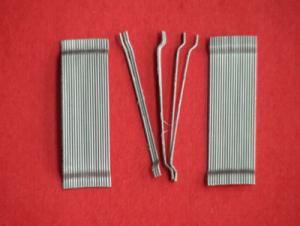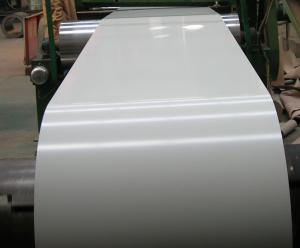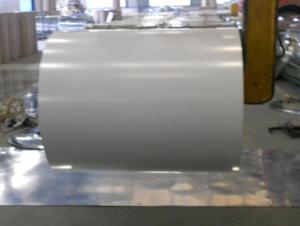Carbon steel pipe fittings TEE 1/2''-42''
- Loading Port:
- China Main Port
- Payment Terms:
- TT OR LC
- Min Order Qty:
- -
- Supply Capability:
- -
OKorder Service Pledge
OKorder Financial Service
You Might Also Like
Pipe fitting is the occupation of installing or repairing piping or tubing systems that convey liquid, gas, and occasionally solid materials. This work involves selecting and preparing pipe or tubing, joining it together by various means, and the location and repair of leaks.
Pipe fitting work is done in many different settings: HVAC, manufacturing, hydraulics, refineries, nuclear-poweredSupercarriers and Fast Attack Submarinescomputer chip fab plants, power plant construction and other steam systems. Pipe fitters (sometimes called simply "fitters") are represented in the USA and Canada by the United Association of Journeymen and Apprentices of the Plumbing and Pipe Fitting Industry of the United States and Canada.
Fitters work with a variety of pipe and tubing materials including several types of steel, copper, iron, aluminium, and plastic. Pipe fitting is not plumbing; the two are related but separate trades. Pipe fitters who specialize in fire prevention are called Sprinklerfitters, another related, but separate trade.
Materials, techniques, and usages vary from country to country as different nations have different standards to install pipe.
Elbow are an English alternative rock band consisting of Guy Garvey (vocals, guitar), Richard Jupp (drums, percussion), Craig Potter (keyboards, piano), Mark Potter (guitar, backing vocals), and Pete Turner (bass guitar, backing vocals). They have played together since 1990, adopting the Elbow band name in 1997, and have released six studio albums: Asleep in the Back (2001), Cast of Thousands (2003), Leaders of the Free World (2005), The Seldom Seen Kid (2008), Build a Rocket Boys! (2011), and The Take Off and Landing of Everything (2014). All of their studio albums, as well as B-sides compilation Dead in the Boot (2012), have placed in the top 15 of the British album chart and seven of their singles have placed in the top 40 of the British singles chart.
In 2008 Elbow won the Mercury Music Prize for their album The Seldom Seen Kid, and in 2009 they won the Brit Award for Best British Group In 2012 they released "First Steps", the BBC theme for the 2012 London Olympics
Specifications
Standard: ASTM A234 WPB, JIS, DIN, EN, GOST
Use for Oil, Gas, Subwatering act.
45/90/180 degree, LR/SR Elbow
ASTM A234 WPB ELBOW :
| ||||||||
| we are manufacturer for carbon steel pipe and fittings,like 45deg,90deg,180deg,L/R OR S/R,bend , | ||||||||
| equal or reducing tee, CON reducer, ECC reducer, pipe cap,flange. | ||||||||
| CON AND ECC REDUCER: CARBON STEEL,STAINLESS,STELL,ALLOY STEEL | ||||||||
| NOMINAL DIAMETER | BIG OD1 | SMALL OD2 | HEIGHT(MM) | |||||
| MM | SERIES A | SERIES B | SERIES A | SERIES B | 51-711 | |||
| 25*15--1500*1400 | 33.7-1524 | 32-1520 | 21.3-1420 | 18-1420 | ||||
| MATERIAL: A234WPB,A283,A105,A53,A106,API5L | ||||||||
| STANDARD: ASTM/ANSI,DIN,ISO,GB,JIS,BS ,GOST | ||||||||
| OTHERS: | ||||||||
| 1. Special design available according to requirement | ||||||||
| 2. All the production process are made under the ISO 9001:2000 strictly. | ||||||||
- Q:How are steel products used in the agricultural sector?
- Steel products are extensively used in the agricultural sector for various purposes. They are commonly used in the construction of farm buildings, storage facilities, and equipment such as tractors, plows, and harvesters. Steel is also used in fencing, gates, and barriers to secure livestock and crops. Additionally, steel is employed in irrigation systems, silos, and grain bins for efficient water management and storage of agricultural products.
- Q:How is steel used in the manufacturing of railway tracks?
- Steel is used in the manufacturing of railway tracks due to its high strength and durability. It is used to create the rails, which provide a smooth and stable surface for trains to travel on. Additionally, steel is also used in the construction of other track components such as sleepers, fasteners, and switches, ensuring a reliable and long-lasting railway infrastructure.
- Q:What are the different types of steel cables and their uses?
- There are several types of steel cables, each designed for specific applications. Some common types include galvanized steel cables, stainless steel cables, and carbon steel cables. Galvanized steel cables are coated with a layer of zinc to prevent corrosion, making them suitable for outdoor and marine environments. Stainless steel cables are highly resistant to corrosion, heat, and chemicals, making them ideal for applications in harsh conditions such as in the aerospace or chemical industry. Carbon steel cables are strong and durable, commonly used in construction, automotive, and manufacturing industries. Overall, the choice of steel cable depends on the specific requirements of the application in terms of strength, corrosion resistance, and environmental conditions.
- Q:How are steel beams used in construction?
- Steel beams are commonly used in construction to provide structural support and stability to buildings and other structures. They are typically used in the framing of walls, floors, and roofs, as well as in the construction of bridges and large-scale infrastructure projects. Steel beams are strong, durable, and can be fabricated to various lengths and shapes, allowing for versatile and efficient construction.
- Q:How are steel products used in the manufacturing of electrical equipment?
- Steel products are used in the manufacturing of electrical equipment to provide structural support and protection for delicate components, such as transformers, generators, and circuit breakers. Steel is used in the construction of cabinets, enclosures, and frames to ensure durability, stability, and electromagnetic shielding.
- Q:What are the different grades of steel and their applications?
- There are several grades of steel, each with its own unique properties and applications. Some common grades include: 1. Carbon Steel: This is the most common type of steel and is used in a wide range of applications, including construction, automotive, and manufacturing. It is known for its strength and low cost. 2. Stainless Steel: This grade of steel contains a minimum of 10.5% chromium, which gives it excellent corrosion resistance. It is commonly used in kitchen appliances, medical equipment, and architectural structures. 3. Alloy Steel: This type of steel is made by adding other elements such as nickel, chromium, or molybdenum to enhance its properties. Alloy steel is often used in the aerospace industry, automotive components, and machinery. 4. Tool Steel: Designed for making tools, this grade of steel is known for its hardness, resistance to wear, and ability to retain sharp edges. It is commonly used in the production of cutting tools, dies, and molds. 5. High-Strength Low-Alloy (HSLA) Steel: This grade of steel offers higher strength and improved formability compared to carbon steel. It is used in structural applications, such as bridges, buildings, and automotive frames. These are just a few examples of the various grades of steel available, each catering to different requirements and industries.
- Q:How is steel wire rope used in elevators?
- Steel wire rope is used in elevators to provide the necessary strength and support for lifting heavy loads. It is typically used as the main hoisting cable, ensuring smooth and safe vertical movement of the elevator car. The steel wire rope is highly durable and can withstand the constant stress and tension experienced during elevator operation, making it an essential component in ensuring the reliability and safety of elevators.
- Q:How is steel used in the manufacturing of machinery and equipment?
- Steel is used in the manufacturing of machinery and equipment due to its exceptional strength, durability, and versatility. It is commonly used to create the structural frames, components, and parts of various machines and equipment. Additionally, steel can be easily shaped, welded, and machined, allowing for precise customization and assembly. Its resistance to wear, corrosion, and high temperatures makes it ideal for heavy-duty applications, ensuring the longevity and reliability of machinery and equipment in various industries.
- Q:What is the role of steel in the infrastructure development?
- The role of steel in infrastructure development is crucial as it provides strength, durability, and flexibility to various structures such as bridges, buildings, and highways. Steel's high tensile strength allows for the construction of taller and larger structures, ensuring their stability and safety. Additionally, steel is resistant to corrosion, making it suitable for withstanding harsh weather conditions and extending the lifespan of infrastructure. Its versatility and recyclability also contribute to cost-effectiveness and sustainability in construction projects. Overall, steel plays a vital role in the development of resilient and long-lasting infrastructure.
- Q:How are steel products used in the chemical industry?
- Steel products are widely used in the chemical industry for various applications such as storage tanks, pipelines, reactors, and other equipment. The durability and resistance of steel make it suitable for handling corrosive and high-pressure substances. Additionally, steel's high melting point allows it to withstand extreme temperatures in chemical processes. Overall, steel products play a critical role in ensuring the safe and efficient handling of chemicals in the industry.
1. Manufacturer Overview |
|
|---|---|
| Location | |
| Year Established | |
| Annual Output Value | |
| Main Markets | |
| Company Certifications | |
2. Manufacturer Certificates |
|
|---|---|
| a) Certification Name | |
| Range | |
| Reference | |
| Validity Period | |
3. Manufacturer Capability |
|
|---|---|
| a)Trade Capacity | |
| Nearest Port | |
| Export Percentage | |
| No.of Employees in Trade Department | |
| Language Spoken: | |
| b)Factory Information | |
| Factory Size: | |
| No. of Production Lines | |
| Contract Manufacturing | |
| Product Price Range | |
Send your message to us
Carbon steel pipe fittings TEE 1/2''-42''
- Loading Port:
- China Main Port
- Payment Terms:
- TT OR LC
- Min Order Qty:
- -
- Supply Capability:
- -
OKorder Service Pledge
OKorder Financial Service
Similar products
New products
Hot products
Related keywords
